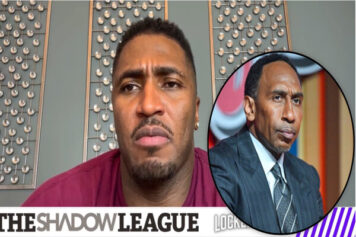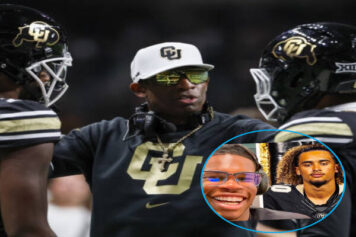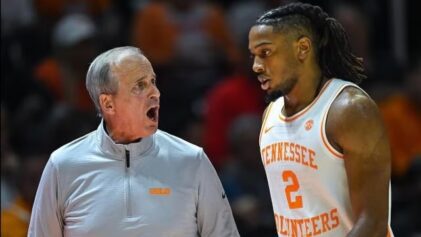HOF Safety Brian Dawkins was a monster on the football field, a seemingly indestructible force who was recognized by fans and media as a gridiron Superman with the perfect life, which made it even harder for him to open up about his battle with depression while playing in the NFL.
During his Pro Football Hall of Fame induction, Dawkins joined the many celebrities opening up about their experiences with the mental health disease, while helping to shed the negative stigma attached to mental health problems.
uSTADIUM on Twitter
Brian Dawkins with an inspiration message during his #HOF speech. https://t.co/OB0donYKuv
2018 has been a pivotal year in the country’s battle against depression and enlightening people about an issue that was once seen as something that only affected the weak, folks who couldnt deal with life.
As we gain more knowledge about mental health issues and begin to shed cultural stigmas, we have discovered that high impact, highly successful people such as The Rock and former and current NBA players such as Nate Robinson and DeMar DeRozan have also suffered through depression. They too have been open with their experiences in order to inspire others and to seek help, rather than try and suppress it for fear of being judged, mischaracterized or labeled.
Former NFL wide receiver Steve Smith Jr. is the latest athlete to reveal struggles with depression and encourage others to get help. In an article he wrote for NFL.com, Smith referred to the shocking suicides of Kate Spade and Anthony Bourdain in June and chronicled his struggles with the illness.
It’s crucial for everyone to know that acknowledging personal struggles isn’t a sign of weakness, but one of strength. Too often taboo, depression is shut behind closed doors — especially in a tough-guy sport like football, with a social media environment that glorifies successes and status.
The first time I stepped into a counseling session was in 2002, when I saw a sports psychologist. I was able to retain what helped me reach my peak performance and able to get in the zone, shutting out the noise and negative thoughts on the field. I did that with flying colors, but I wasn’t able to grasp that concept in my life outside of the game. I couldn’t quiet the noise and negative thoughts in my mind. It wasn’t until I stepped away from the game at the end of the 2016 NFL season that I really began to take ownership and understand my personal journey with depression.
Around The NFL on Twitter
NFL Media exclusive: Steve Smith Sr. details his personal battle with depression https://t.co/TTaVUByej7
Don’t get me wrong: I love football. Always have. I took immense pride in being a tough, in-your-face wide receiver, and I am content with what I did in my career. I hung it up after 16 years of antagonizing defensive backs, putting up 14,731 receiving yards and 81 receiving touchdowns on ’em, while making five Pro Bowls and earning two first-team All-Pro nods…
Well, what if I told you I never truly enjoyed those moments, never felt genuine delight in my accomplishments?
One common question I contemplated through the highs and lows was simple, but felt so complex:
What’s wrong with me?
Despite all of my achievements, I routinely felt trapped, inferior and alone. This overwhelmed me internally and often left me mentally, physically and emotionally broken.
Generally, throughout much of my life, unhappiness, constant self-criticism and an inability to let old blunders go weighed so heavily on my mind. I can recall hundreds of these moments, on and off the gridiron, when I felt inept. It really took a toll on my mental state.
Jamison Hensley on Twitter
Is Steve Smith Sr. a HOF lock? It’s not that simple (from @SandoESPN) https://t.co/Et4enU89Hy
In 2013, my final year in Carolina, I hit a point where I was so overwhelmed that I wasn’t sure what to do or how to handle my emotions. Small things in my daily life impacted me in a big way, and I was a cynic of everything and everyone. It was at that point I decided — with hesitancy — to try counseling for non-football related matters for the first time in my life.
I continued counseling sessions when I got to Baltimore the following year. I saw small changes in myself, but even more, I started seeing all my flaws. That’s a hard thing to accept for anyone. After tearing my Achilles midway through what was to be my final season, I remember sitting in the hospital bed recalling dropped passes from 10 years prior. Mind you, at the time of my injury, I needed just 49 catches to hit 1,000 for my career.
But now, a year and a half has passed since my last NFL game, and for the first time in my life, I finally feel free.
What’s wrong with me?
…There’s nothing wrong with me, nor is there with anyone else who suffers from depression and other mental health disorders. All human beings have strengths and weaknesses, physical and mental. You’re defined by how you play the hand you’re dealt in life. I’ve spent the last year grieving, in a sense, the fact that I no longer am a football player — the one thing I have been my entire life. Re-Identifying myself has been quite the process and learning to be OK with that even more so.
My advice to anyone suffering from mental health issues — and specifically athletes who can relate — is this: Ask for help. Stop trying to deal with these serious matters alone. You’re not alone. Believe me.
Lindsey Adler on Twitter
I really appreciate athletes like Serena Williams, Steve Smith Sr., Andrew Toles, and a bunch of NBA players speaking publicly about dealing with depression and anxiety. Depression is my forever co-pilot, so I understand how tough that can be to make public.
Being forthcoming about mental health issues is especially hard for guys like Dawkins and Smith Sr. who play pro football. “Too often taboo, depression is shut behind closed doors — especially in a tough-guy sport like football, ” Smith Sr. wrote. “With a social media environment that glorifies successes and status.”
Its estimatedthat 16.2 million adults in the United States, or 6.7 percent of American adults, have had at least one major depressive episode in a given year. The National Institute of Mental Health (NIMH) estimates that 16.2 million U.S. adults had at least one major depressive episode in 2016. This represents 6.7 percent of the U.S. adult population.
The WHO estimates that more than 300 million people worldwide suffer from depression. Its also the worlds leading cause of disability.
With so many high profile people admitting to their depression, bi-polar disorders and other common mental health issues, that openness has inspired others to seek help for a disease that can damage family, friendships, careers and most importantly your quality of life.



